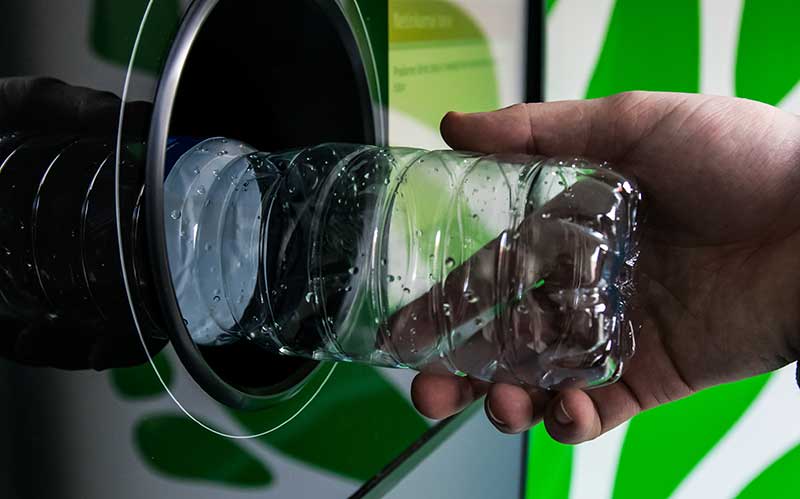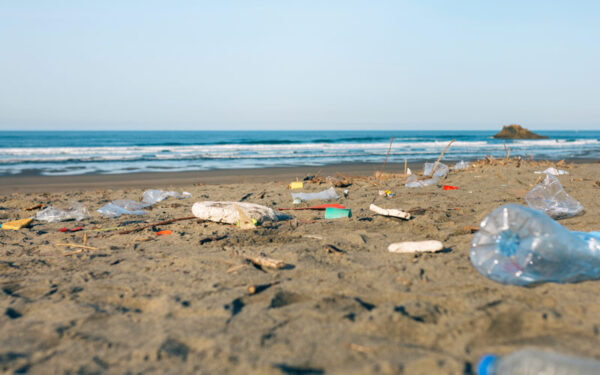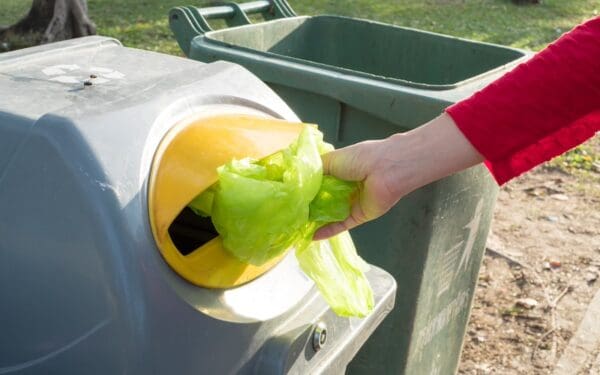
Connecticut's modernized bottle bill is a mixed bag, with some important updates, but also late additions that could undermine its effectiveness. Photo: Rokas Tenys via Shutterstock
Connecticut’s bottle return program has long needed an upgrade. As with other New England states, Connecticut’s 5-cent deposit on beverage containers isn’t enough of an incentive to drive bottle redemption and recycling – and hasn’t been for some time. In fact, the 5-cent fee hasn’t changed since the program started in 1980. As a result, consumers returned only 44% of their beverage containers in 2020.
For years, CLF and other environmental organizations have pushed lawmakers to modernize the state’s bottle bill. During the first week of June, they finally acted – but with mixed results. That’s because a last-minute amendment hands control of the program over to the beverage industry – a group that has attempted to undermine and destroy bottle redemption programs for decades.
So, while the legislation includes upgrades we’ve been pushing for – adopting a 10-cent deposit fee, increasing the handling fee paid by beverage distributors, and expanding the list of beverage containers included in the program – it should come as no surprise that we have concerns. The fact is, the modernized bill is both a step forward and a step back.
Here, we’ll dive into the good, the bad, and the ugly of the state’s modernized bottle bill. And, we talk about how we at CLF will keep working to ensure Connecticut’s bottle bill works for all residents.
The Good: Updates That Will Increase Connecticut’s Bottle Redemption and Recycling Rates
By modernizing its bottle bill, Connecticut has become the first state in the Northeast – and only the third in the country, alongside Oregon and Michigan – to put a 10-cent deposit on beverage containers. This puts Connecticut on the path to collecting and recycling many more bottles and cans – and keeping those containers out of dirty, dangerous trash incinerators.
The bill also increased the program’s handling fee. This means beverage distributors will pay redemption centers, grocery stores, liquor stores, and other drop-off locations more money to cover the cost of collecting and storing empty containers before they get picked up for recycling. Because the current handling fee doesn’t always cover the cost of doing business, many Connecticut redemption centers had to close in recent years. But with an increased handling fee, the state can grow its redemption network – making it easier for residents to drop off containers and collect deposits.
Lastly, the updated bill expands the types of beverage containers accepted by the program. It will now include juices, teas, iced coffees, sports drinks, energy drinks, and other noncarbonated beverage containers. This is a big win because thousands of tons of these containers end up in Connecticut’s incinerators every year. But moving forward, more of these containers will be recycled. Think about it this way: The more containers covered under the program, the more the bottle bill can do to protect Connecticut’s environment and its communities.
The Bad: Bottle Bill Reforms Fail to Include Glass Containers
While there’s plenty of good in the updated bottle bill, it could – and should – have gone further. Mainly, it should have included liquor and wine bottles, as well as small, single-serving alcohol bottles (commonly known as “nips”).
Considering up to 60% of the glass (by weight) in single-stream recycling consists of liquor and wine bottles, this was a big missed opportunity. In fact, much of the glass collected through single-stream does not get recycled, and its weight contributes significantly to the increased cost of curbside recycling in Connecticut.
Alcohol nips, on the other hand, are a huge contributor to roadside and waterway litter. They are an all-too-common sight on sidewalks, in parks, and on beaches. Putting a deposit on nips would have gone a long way toward keeping these containers out of our environment.
The Ugly: A Last-Minute Amendment Threatens the Bottle Bill’s Future
Worst of all, the updated bottle bill includes a last-minute amendment that threatens to undo the hard work of those that pushed for its modernization. The amendment establishes a so-called “stewardship organization” controlled by the beverage industry – meaning they will run the state’s bottle redemption system.
This is like letting the fox guard the proverbial henhouse. The beverage industry has worked to undermine Connecticut’s bottle return program for decades. And now, through this “stewardship organization,” they’ll have the power to propose changes to the program moving forward, including adjusting the deposit value.
The truth is, this organization is not a true stewardship program; it’s an industry-run smokescreen. A bona fide stewardship organization would involve, at minimum, a competitive bidding process, robust oversight and accountability metrics, clear enforcement provisions and penalties for failure to meet redemption targets, and meaningful opportunities for public input. The legislation includes none of these provisions. Instead, the bill as written hands the keys over to the very industry that has worked for so long to destroy the program.
CLF Will Keep Fighting for a Better Bottle Bill
Thank you to everyone who took action, called or wrote their legislators, and fought with us to update this critical legislation. While several bottle bill modifications pushed by CLF and other environmental organizations did pass, our work is far from done. We must ensure that Connecticut’s bottle bill reforms are implemented in a way that improves recycling, protects the environment, and makes the program work for all Connecticut residents.
Alongside our partners and community advocates, CLF plans to continue working closely with Connecticut lawmakers and agencies. Together – and with your continued help – we will make sure that any reform plan proposed by the beverage industry represents an equitable and effective bottle return program and that we realize the goals of those who have fought so long for a modernized bottle bill.




